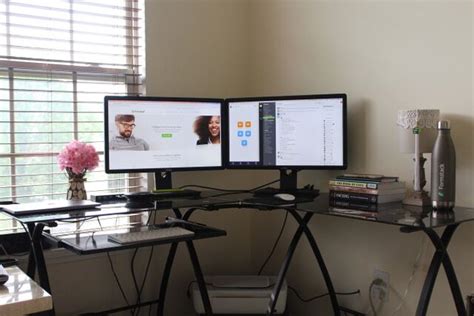As our work environments continue to evolve, many professionals now find themselves adapting to the concept of remote work. Eliminating the traditional office setting calls for a different approach to productivity and focus. To excel in this new work paradigm, it becomes crucial to optimize your efficiency by implementing strategies that will enhance your output and maintain a healthy work-life balance.
Unleashing Your Potential: Working remotely offers a distinct advantage – the freedom to eliminate the confines of a physical office while being able to shape your own workspace. However, managing this newfound freedom effectively can be a challenge. By employing the right techniques and mindset, you can harness your potential and maximize your productivity.
Create a Purposeful Routine: Establishing a structured routine is essential to thriving in a remote work environment. By setting a designated time for work, breaks, and personal activities, you can maintain a healthy work-life equilibrium. Avoid the temptation to blur the boundaries between work and leisure, as doing so can lead to burnout and decreased productivity.
Master the Art of Focus: When working remotely, maintaining focus is vital. Minimize distractions by designating a distraction-free workspace and implementing time management techniques such as the Pomodoro technique. Prioritize tasks, break them down into manageable chunks, and allocate specific time slots to accomplish them. This efficient approach will enable you to stay on track and complete your work with increased focus and quality.
Creating an Effective Setup for Maximizing Your Remote Workspace

Establishing a high-functioning and efficient remote workspace is key to enhancing your productivity while working remotely. By carefully setting up your workspace, you can optimize your work environment to promote focus, minimize distractions, and boost overall work performance. This section provides valuable insights and practical tips for organizing your remote workspace effectively.
- Organize your physical space: Clear away clutter and ensure that your workspace is clean, well-lit, and comfortable. Arrange your equipment and essentials in a logical and accessible manner to enhance workflow.
- Invest in ergonomic furniture: Consider investing in ergonomic furniture, such as an adjustable chair, a standing desk, or a monitor arm. These ergonomic solutions can significantly contribute to your comfort and help prevent physical strain or injuries during extended work hours.
- Prioritize natural lighting: Where possible, position your workspace near a window to maximize exposure to natural light. Natural lighting has been proven to enhance focus, reduce eye strain, and improve mood and overall well-being.
- Set boundaries: Establish clear boundaries between your work and personal life by designating a specific area for work. This helps create a mental separation between work time and personal time, improving focus and preventing burnout.
- Eliminate distractions: Identify potential distractions in your remote workspace and take proactive measures to minimize their impact. This might involve turning off notifications on your phone or using noise-cancelling headphones to block out background noise.
- Cultivate a productive atmosphere: Personalize your workspace with elements that inspire and motivate you, such as motivational quotes, artwork, or plants. Keeping your workspace clutter-free and visually appealing can positively impact your mood and productivity.
- Create a digital organization system: Implement a digital filing system for your files and documents to ensure easy access and organization. Use cloud storage solutions and project management tools to keep your work organized and collaborate effectively with colleagues.
- Establish a routine: Set a consistent daily routine that allows you to effectively manage your time and tasks. Determine your most productive hours and allocate focused work during those periods, while also incorporating regular breaks to recharge and avoid burnout.
- Invest in technology and tools: Identify the essential technological tools and software applications that can streamline your remote work. Whether it's project management tools, communication platforms, or task management apps, selecting the right tools for your needs can significantly enhance your productivity.
- Take care of your well-being: Prioritize your well-being by incorporating ergonomic exercises, stretching, and relaxation techniques into your daily routine. Regular physical activity can boost your energy levels, improve focus, and contribute to your overall mental and physical well-being.
- Regularly assess and adjust: Continuously evaluate your remote workspace setup and make necessary adjustments based on your evolving needs and preferences. Regularly reviewing and optimizing your workspace can help you maintain a productive and efficient environment for remote work.
Creating a Designated Workspace
One essential aspect of optimizing productivity while working remotely is the establishment of a dedicated workspace.
When working from home or any other remote location, it is important to set aside a specific area solely for work-related activities. This designated workspace helps to create a mental and physical boundary between your work life and personal life.
A dedicated workspace enables you to create a professional environment that minimizes distractions and enhances focus. It allows you to replicate the structure and routine of a typical office setup, which can significantly boost your work productivity.
Consider finding a quiet area in your home where you can concentrate without interruptions. Organize your workspace in a manner that reflects your work style and preferences. This could include having a comfortable desk and chair, proper lighting, and any tools or equipment necessary for your specific job.
Having a designated workspace also helps establish a sense of work-life balance. By physically separating your work area from your personal space, you can maintain clearer boundaries and better switch off from work when the day is done.
In summary, creating a dedicated workspace is vital for maximizing productivity while working remotely. It provides a structured environment that promotes focus and minimizes distractions, ultimately leading to better work outcomes and a healthier work-life balance.
Establishing a Daily Routine for Enhanced Focus and Efficiency

Creating a structured and consistent routine can significantly boost productivity and positively impact remote work. By adhering to a well-defined daily schedule, individuals can establish a sense of normalcy and maximize their work potential.
1. Start the day with intention: Begin each morning by setting clear objectives and goals for the day ahead. This helps to maintain focus and drive throughout the workday.
2. Prioritize tasks: Identify the most critical tasks and allocate specific time slots to address them. Consider using productivity techniques such as the Pomodoro Technique to improve concentration and prevent burnout.
3. Create a dedicated workspace: Designate a specific area in your home for work purposes. This helps to separate personal and professional life, allowing for better focus and improved work-life balance.
4. Establish regular breaks: Take periodic breaks to relax and recharge. These pauses can enhance productivity by preventing mental fatigue and boosting creativity.
5. Incorporate physical activity: Engage in regular exercise to improve both physical and mental well-being. Physical activity revitalizes the mind and body, leading to increased productivity and overall job satisfaction.
6. Minimize distractions: Eliminate potential distractions by turning off notifications, setting specific times to check emails, and utilizing tools that block irrelevant websites or applications during working hours.
7. Designate specific work hours: Establish clear start and end times for work to create structure and avoid overworking. Communicate these hours with colleagues, ensuring effective collaboration and mutual understanding.
8. Practice self-care: Prioritize self-care activities such as mindfulness exercises, meditation, or hobbies outside of work. This promotes mental well-being and helps individuals to recharge, leading to increased productivity in the long run.
By incorporating these strategies into your remote work routine, you can optimize your productivity, maintain a healthy work-life balance, and achieve greater success in your professional endeavors.
Enhancing Communication Skills in Distributed Teams
Smooth and effective communication is vital for the success of remote work teams. In order to foster collaboration and maintain strong connections, it is essential to develop and practice good communication skills. Here are some valuable insights to improve communication within distributed teams:
- Active Listening
- Clear and Concise Messaging
- Utilize Video Conferencing
- Establish Communication Norms
- Embrace Collaboration and Feedback
Active listening is an crucial skill for effective communication in remote teams. To demonstrate your attentiveness and understanding, make sure to give your full attention to the speaker, avoid interruptions, and provide feedback. Encourage all team members to actively listen and engage in conversations to ensure everyone's perspectives and ideas are considered.
Communication in remote teams heavily relies on written messages. Therefore, it is important to convey your thoughts clearly and concisely. Use plain language and avoid jargon or technical terms that may not be understood by everyone. Break down complex ideas into smaller, more manageable parts to facilitate understanding for all team members.
While written communication is necessary, incorporating video conferencing can greatly enhance the remote team's communication experience. Face-to-face interactions through video calls help build closer connections, foster trust, and ensure that non-verbal cues are not lost. Make the most of video conferencing tools to conduct team meetings, brainstorming sessions, and one-on-one discussions.
Setting clear communication norms and expectations is crucial for remote teams. Establish guidelines regarding response times, preferred communication channels, and availability. Encourage regular check-ins and updates to keep everyone informed and aligned. Clarify expectations for professional behavior and encourage open and transparent communication among team members.
Collaboration and feedback play a vital role in remote teams' success. Encourage team members to actively participate in discussions, share ideas, and provide constructive feedback. Foster an environment where everyone feels comfortable expressing their thoughts and opinions. Collaborative tools and platforms can also be utilized to facilitate virtual brainstorming sessions and document sharing.
Effective communication is the backbone of any successful remote team. By actively practicing good communication skills, fostering open dialogues, and utilizing appropriate tools and technologies, remote teams can overcome communication barriers and achieve higher levels of productivity and collaboration.
FAQ
How can I stay focused while working remotely?
To stay focused while working remotely, it's important to create a dedicated workspace free from distractions. Set clear boundaries with family members or roommates, establish a routine, and take breaks in between tasks to recharge. Additionally, using productivity tools such as time management apps or implementing the Pomodoro technique can help improve focus and maintain productivity.
What are some effective ways to balance work and personal life when working remotely?
Balancing work and personal life while working remotely can be challenging but achievable. It's crucial to set clear boundaries between work and personal time. Establish a daily schedule that includes specific work hours and personal time for activities, hobbies, or spending time with family and friends. Prioritize self-care and practice mindfulness to avoid burnout, and avoid bringing work into personal spaces to maintain a healthy work-life balance.
How can I stay motivated while working remotely?
Staying motivated while working remotely can be challenging without a traditional office environment. To maintain motivation, set clear goals and celebrate accomplishments. Break tasks into smaller, manageable steps to stay focused and motivated throughout the day. Establish a routine and create a designated workspace that promotes productivity and inspires motivation. Additionally, regular communication with colleagues and seeking support from a remote work community can keep motivation levels high.
What are the best ways to communicate effectively with a remote team?
Communicating effectively with a remote team is crucial for successful collaboration. Utilize various communication tools such as video conferencing, instant messaging, and project management platforms. Establish regular check-ins and team meetings to ensure everyone is on the same page and provide updates. Practice active listening and encourage open and transparent communication. It's also important to be understanding of different time zones and cultural differences that may affect communication dynamics.



